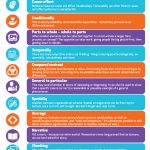A health care administrator was talking with me about digital health tools. …
One way to save time in patient education
The nurse administrator looked at me and said, “Time. Everything is about time.” …
[Read more...] about One way to save time in patient education
3 communication hints for hotspotting teams
Hotspotting is hot! I have had friends on hotspotting teams telling me about …
[Read more...] about 3 communication hints for hotspotting teams
10 different ways to organize a complex idea
During patient education you are often dealing with medical or scientific …
[Read more...] about 10 different ways to organize a complex idea
What does “healthy” mean to your patient?
As providers, you have information that will help your patients be healthier. …
[Read more...] about What does “healthy” mean to your patient?
What you need to know about health literacy and health apps
When physicians talk with me about apps, those conversations tend to fall into …
[Read more...] about What you need to know about health literacy and health apps






